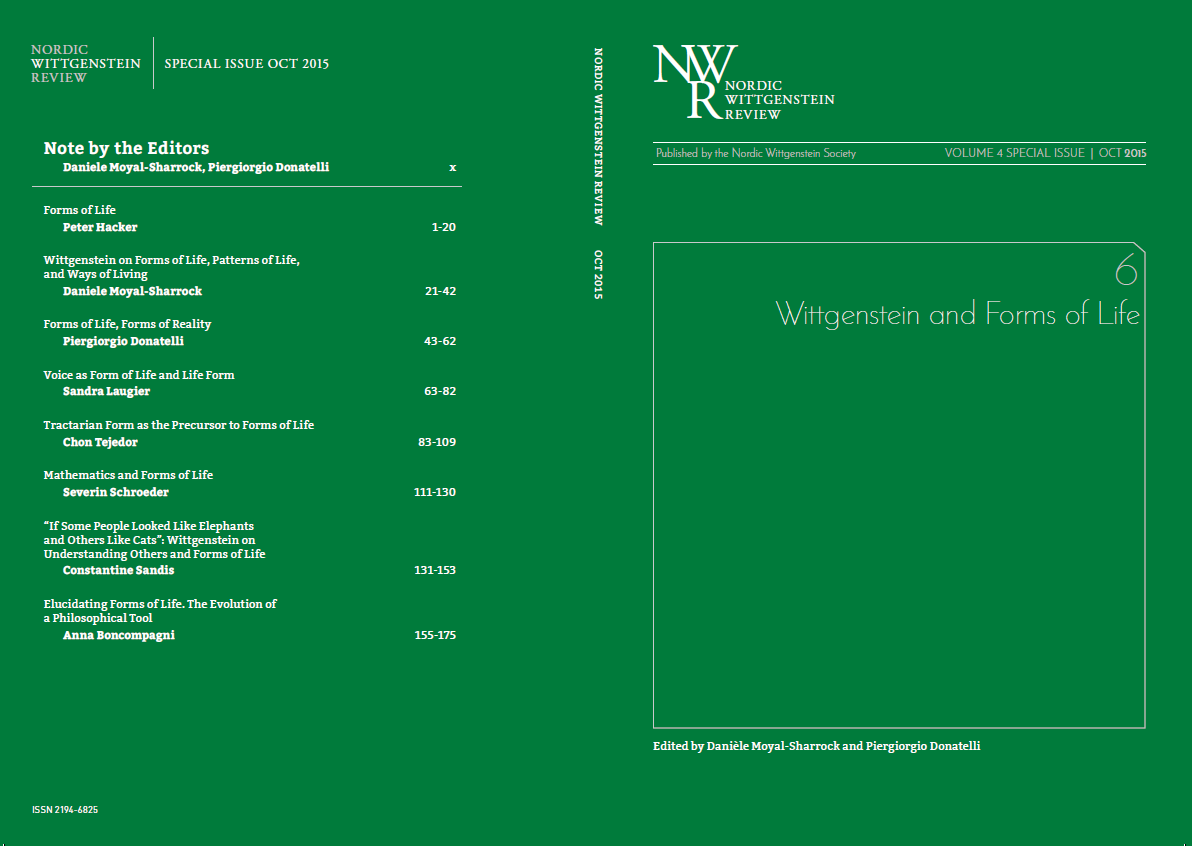Forms of Life, Forms of Reality
DOI:
https://doi.org/10.15845/nwr.v4i0.3374Keywords:
Wittgenstein Ludwig, form of life, background, ethics, realism, Murdoch IrisAbstract
The article explores aspects of the notion of forms of life in the Wittgensteinian tradition especially following Iris Murdoch’s lead. On the one hand, the notion signals the hardness and inexhaustible character of reality, as the background needed in order to make sense of our lives in various ways. On the other, the hardness of reality is the object of a moral work of apprehension and deepening to the point at which its distinctive character dissolves into the family of connections we have gained for ourselves. The two movements of thought are connected and necessary.
References
Cavell, S., 1989. This New Yet Unapproachable America. Lectures after Emerson after Wittgenstein. Albuquerque, N.M.: Living Batch Press.
Cercas, J., 2003. Soldiers of Salamis. Transl. A. McLean. London: Bloomsbury.
Coetzee, J.M., 1999. Disgrace. New York, Penguin.
Deleuze, G., 2001. “Immanence: A Life”. In G. Deleuze, Pure Immanence. Essays on A Life. Transl. A. Boyman. New York: Zone Books, pp. 25-33.
Dickens, C., 1998. Our Mutual Friend. Oxford: Oxford University Press.
Diamond, C., 1990. “How Many Legs?”. In R. Gaita, ed., Value and Understanding. Essays for Peter Winch. London: Routledge, pp. 149-78.
Diamond, C., 1991. “Eating Meat and Eating People”. In C. Diamond, The Realistic Spirit. Wittgenstein, Philosophy, and the Mind. Cambridge, Mass: The MIT Press, pp. 319-34.
Diamond, C., 2008. “The Difficulty of Reality and the Difficulty of Philosophy”. In S. Cavell, C. Diamond, J. McDowell, I. Hacking, C. Wolfe, Philosophy and Animal Life. New York: Columbia University Press, pp. 43-89.
Murdoch, I., 1998a. “Vision and Choice in Morality”. In I. Murdoch, Existentialists and Mystics. Writings on Philosophy and Literature. New York: Allen Lane / Penguin, pp. 76-98.
Murdoch, I., 1998b. “The Idea of Perfection”. In I. Murdoch, Existentialists and Mystics. Writings on Philosophy and Literature. New York: Allen Lane / Penguin, pp. 299-336.
Murdoch, I., 1998c. “On ‘God’ and ‘Good’”. In I. Murdoch, Existentialists and Mystics. Writings on Philosophy and Literature. New York: Allen Lane / Penguin, pp. 337-62.
Murdoch, I., 1998d. “The Sovereignty of Good over Other Concepts”. In I.
Murdoch, Existentialists and Mystics. Writings on Philosophy and Literature. New York: Allen Lane / Penguin, pp. 363-85.
Sen, A., 2009. The Idea of Justice. Cambridge, Mass.: Harvard University Press.
Wittgenstein, L., 1980. Remarks on the Philosophy of Psychology. Volume II. Eds. G.H. von Wright, H. Nyman. Transl. C.G. Luckhardt, M.A.E. Aue. Chicago: The University of Chicago Press.
Wittgenstein, L., 2009. Philosophische Untersuchungen. Philosophical Investigations. Revised Fourth Edition. Eds. P.M.S. Hacker, J. Schulte. Transl. G.E.M. Anscombe, P.M.S. Hacker, J. Schulte. Oxford: Wiley-Blackwell.
Downloads
Published
How to Cite
Issue
Section
License
NWR uses the Creative Commons license CC-BY.
Vol. 1-3 used CC-BY-NC-SA. The collected works copyright ownership for Vol. 1-2 were shared by Nordic Wittgenstein Society and ontos Verlag/De Gruyter.








